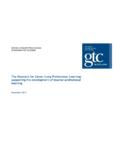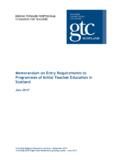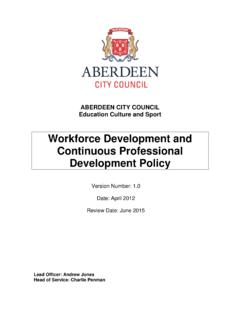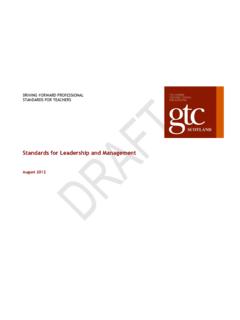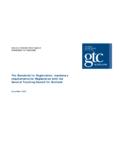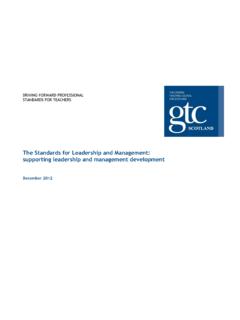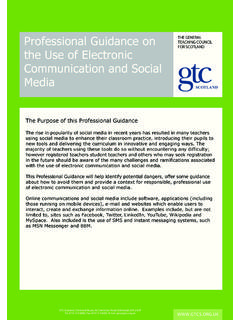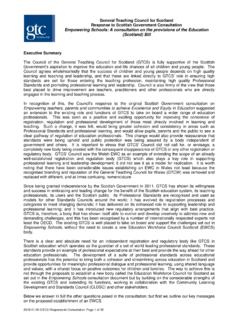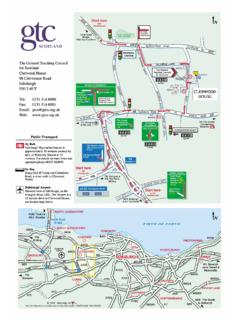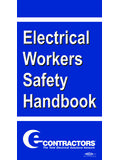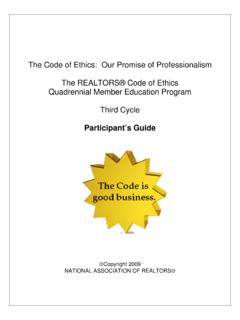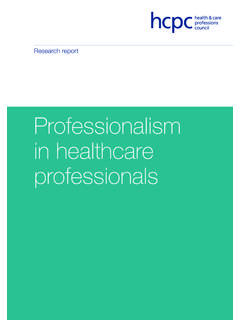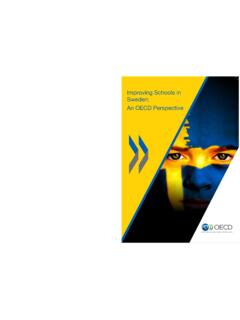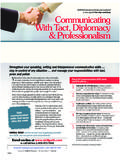Transcription of Code of Professionalism and Conduct
1 The General TeachinG council for forward profeSSional STandardS for TeacherSCode of Professionalismand Conductabout this publicationThe information contained in this brochure was correct at the time of publication. GTc Scotland cannot be held responsible for any issues arising from any errors or subsequent changes in requirements. The General TeachinG council for ScoTlandcopyright General Teaching council for Scotland 2012. all rights reserved. on no account may any part of this publication be reproduced in any form without the written permission of the copyright GTcSThe General Teaching council for Scotland is the world s first independent, self-regulating professional body for teaching. we aim to maintain and enhance teaching standards and promote the teaching profession in Scotland. GTc Scotland aims to promote equality and diversity in all its 3 GTc Scotland ( GTc Scotland ) is the independent professional body which maintains and enhances teaching standards and promotes and regulates the teaching profession in Scotland.
2 The council has a duty to regulate teachers in the public interest and, in so doing, is accountable to the public and the profession for maintaining standards and ensuring that teachers are fit to protection of children and young people and their educational wellbeing, along with the reputation of, and the public s trust in, the teaching profession, sits at the heart of GTc Scotland s fitness to teach regulation. Therefore regulatory measures, which may seem to be punitive in effect, should always be viewed within the context of what is considered necessary to Further details of the GTC Scotland Fitness to Teach procedures and processes can be found at The General Teaching Council for ScotlandPurposeThis code of Professionalism and Conduct sets out the key principles and values for registered teachers in Scotland. in accordance with the general principles of the un convention on the rights of the child and GTc Scotland s wider framework of standards, this code and commentary states not only to the profession, but also to members of the public, the standard of Conduct and competence expected of registered teachers.
3 The code of Professionalism and Conduct and commentary cannot address every possible circumstance in which teachers might find themselves. however, it is intended that teachers are mindful of the code in relation to the judgements which they will be called upon to make in situations which may occur both within and outwith the professional context. although the behaviours described in this code will be unthinkable to the vast majority of registered teachers and members of the public, GTc Scotland has a duty to identify them so that the boundaries of professional behaviour and Conduct are clear and public trust in teachers is code its purpose, scope and 5 ScopeThis code applies to fully registered and also, with the exception of part 3, to provisionally registered teachers in whatever educational context the registered teacher may work. it also applies to all other currently registered teachers, whatever their sector of employment or employment the code , where the term pupil is used, it refers to learners in the wider sense and therefore includes those being educated in the pre-five, primary, secondary and further education this code replaces the 2008 code on 2 april 2012, parts 1 4 of the 2008 code will continue to apply to complaints which are related to periods prior to that date.
4 This is guidance and not a statutory code ; therefore teachers must use their own judgement and common sense in applying the principles to the various situations in which they may find themselves. however, teachers must be aware that a serious breach or series of minor breaches of these principles could lead to action which may result in an adverse fitness to teach finding and imposition of any of the sanctions open to the should embrace the notion of personal regulation based on common sense and good professional judgement. Therefore, the code and its commentary is not intended to be an exhaustive list of unacceptable or unwise behaviours, but rather it is designed to provide guidance and raise awareness of issues and situations which can potentially information about GTC Scotland s regulatory role, sources of complaint and legislative responsibilities in connection with provisionally registered or fully registered teachers can be found at The General Teaching Council for ScotlandPart 1: Professionalism and maintaining trust in the professionas a registered you should have a knowledge of and maintain the key principles within the professional Standards, codes, professional advisory Statements and Guidance issued by GTc Scotland, as these may be reviewed and reissued from time to time.
5 You must maintain appropriate professional boundaries, avoid improper contact or relationships with pupils and respect your unique position of trust as a teacher; you should avoid situations both within and outwith the professional context which could be in breach of the criminal law, or may call into question your fitness to teach; you must uphold standards of personal and professional Conduct , honesty and integrity so that the public have confidence in you as a teacher and teaching as a profession; you should be professional, honest and act with integrity in your dealings and correspondence with GTc Scotland, other regulatory (or similar) bodies and employers (including prospective and past); you should maintain an awareness that as a teacher you are a role model to and carers in particular, and the public in general, place a very high degree 7of trust in those who are educating pupils, and rely upon teachers to interpret what is right and what is wrong.
6 Teachers are often called upon to make difficult decisions regarding pupils and therefore, in exercising judgement, you should think very carefully of the implication and potential consequences of the options open to you. as a teacher, you should also bear in mind how your decision and subsequent action may appear or be interpreted by others not fully aware of all of the circumstances. PupilsTeachers should establish professional boundaries, and recognise the negative impact that actual or perceived breaches of these would have upon pupils and the confidence of the public. with regard to relationships with pupils, you should: in managing behaviour: be aware of and adhere to behaviour management protocols and strategies and not harm or use physical violence against a child or pupil in or outwith the educational establishment context; take into account reasonable norms and best practice when conducting interviews with pupils, in a disciplinary context, and have due regard to their age, stage and individual circumstances; appreciate fully that the onus is upon you as the teacher and not the pupil to distance yourself from any potentially inappropriate situation; avoid sexual contact with or remarks towards a pupil of school age, regardless of the apparent consent of the individual concerned; be mindful that professional boundaries can be perceived to extend beyond a pupil s educational establishment leaving date.
7 Therefore, in situations of this nature, you should exercise great care and professional judgement, taking into account all the factors involved; not attempt to establish an inappropriate relationship with any pupil by means which might include (but are not limited to): communication of a personal nature; engaging in an inappropriate way through the internet or by other means with pupils; sending e-mails or text messages to pupils, of an inappropriate nature. as a teacher you must: not discuss with pupils your own intimate and personal relationships and be mindful to maintain an appropriate balance between formality and informality when you are dealing with pupils; take care to avoid becoming personally involved in a pupil s personal affairs; be aware of the potential dangers of being alone with a pupil (in particular under 18 years of age) in a private or isolated situation, using common sense and professional judgement to avoid circumstances which are, or could be, perceived to be of an inappropriate nature.
8 This is also the case in connection with social networking websites, outwith the setting of the educational establishment and in subject areas such as music, physical education and drama; be mindful that the internet and social networking can quickly blur 8 The General Teaching Council for Scotlandthe professional boundary between teacher and pupil. Teachers need to be alert to the risk that actions which might, on the face of it, seem quite innocent, can be misunderstood and misconstrued by others; avoid inappropriate communication (including via social networking) with individuals under 18 or in relation to whom you may be in a position of trust or have a professional relationship; not by any means or in any circumstances, make, view or access illegal or inappropriate images of children or protected adults; be mindful of the negative impact of being under the influence of alcohol in the professional setting.
9 Educational Excursions excursions have an important part to play in the life of pupils, and can greatly enrich the educational experience of pupils taking part. physical safety is of prime importance. however, particularly in the residential setting, relationships tend to be less formal and the environment is very different from that in an educational establishment. You should not allow yourself to overstep the professional boundaries and remember that the professional standard of behaviour expected of you on an educational excursion outwith the structure of the normal working day is no different from that of the professional norm. accordingly you should ensure, for example, that you: have a full knowledge of, and comply with, the procedures and guidelines laid down for these activities by your educational establishment and the requirements of health and safety; are always mindful of the need to maintain an appropriate balance between formality and informality and avoid situations which are or could be reasonably perceived to be of an inappropriate nature.
10 Honesty and IntegrityThe good standing of the teaching profession is at the heart of the regulatory role of GTc Scotland. Therefore as a teacher you must: not engage in behaviour of a criminal nature, especially related to sex, dishonesty, firearms, misuse of drugs and violence against a person or property or serious public order offences, which would be of particular concern in regard to a teacher s professional status and fitness to teach; be honest and trustworthy, especially avoiding offences such as theft, dishonesty, extortion, fraud or misuse of drugs; have due regard to the trust in you as a teacher and therefore act with integrity and honesty in applying for registration and in all your dealings with GTc Scotland, in making declarations and undertakings in professional applications/submissions, in the writing of references for colleagues or pupils and in the Conduct of tasks in connection with examinations and/or assessments.
